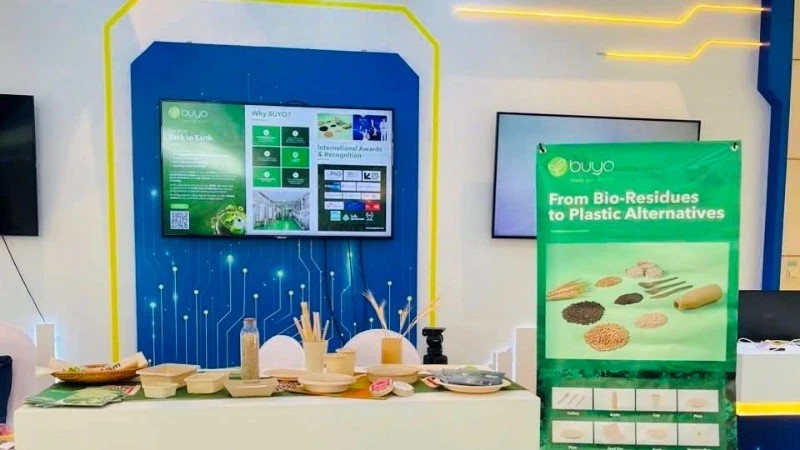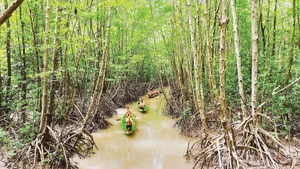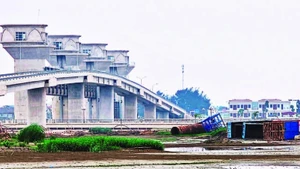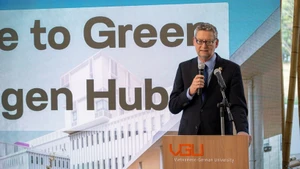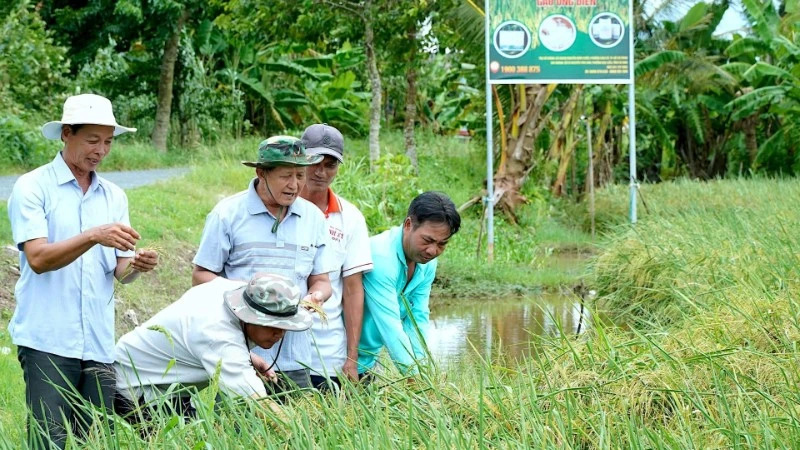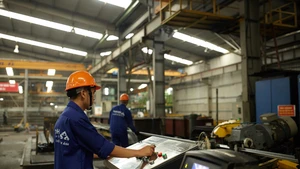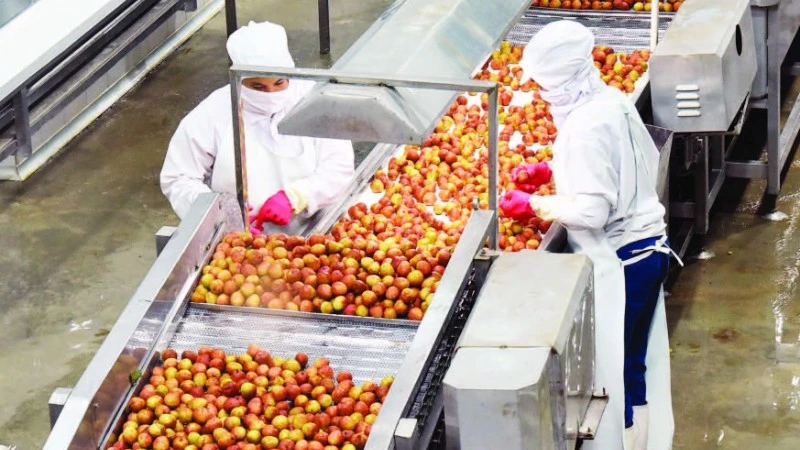Three years ago, with the desire to find new materials to replace plastic, especially nylon bags, BUYO Bioplastics - a Vietnamese innovative startup was born, focusing on developing technology to produce bioplastics of organic origin such as beer lees and cassava residue that can decompose in the natural environment.
With the pioneering biomaterial technology developed by BUYO, waste from the agricultural and food processing industries has been transformed into “resources” for biodegradable packaging materials, which do not create microplastics, but still ensure the same features as conventional plastic.
In addition, BUYO also owns exclusive microbiological technology to produce high-tech materials in biomedicine and pharmaceutical cosmetics. BUYO is currently operating a factory with a capacity of 120 tonnes per year in Vietnam, preparing to expand its scale by 10 times in the near future, and has plans to expand to the Asian, European and American markets. This is one of six typical Vietnamese startups on the list of receiving financial and technical support from P4G for climate change response projects.
In response to the great demand for new generation bioplastics, BUYO is prioritizing solutions to increase scale, improve production capacity, and at the same time invest in improving technology and reducing costs to be able to compete on price.
Do Hong Hanh, CEO and co-founder of BUYO Bioplastics, said: "The company is currently in the research and development phase of new technology so that green solutions can be applied in many fields such as biomedicine, cosmetics, textiles".
At the exhibition, many domestic and foreign organisations and enterprises were interested and connected with this startup to participate in industries such as packaging, fast-moving consumer goods, food, beverages, restaurants, and hotels.
At the Green Growth Exhibition, fabrics spun and woven from pineapple fiber were introduced. This is a product created by mechanical methods, without using water and chemicals.
Vietnam Natural Fiber Research, Investment and Development Joint Stock Company (Vietfiber) owns a specialised cotton fiber production line for pineapple fiber, which does not use water in the fiber separation process, so it does not affect the soil and water environment.
According to Vietfiber's representative, the process of this technology helps save 400,000 cubic metres of production water, reduce 400,000 cubic metres of wastewater, reduce 1.12 million liters of chemicals used to treat fibers and save 2,750 tonnes of coal used to treat fibers. This also reduces the cost by 30% compared to the method of using water and chemicals.
While making use of 52,000 hectares of wasted pandan leaves and preventing pollution caused by burning leaves, Vietfiber aims to supply 63,000 tonnes of fiber each year, completely replacing imported cotton and promoting green fashion.
The production system is automated from leaf cutting, fiber separation to cottonisation. This is an effective model, contributing to realizing the goal of reducing emissions in the textile industry and sustainable development. Thereby effectively utilizing waste products, pandan leaf residue is regenerated into biofertilizer, animal feed, and food coloring.
Although this pineapple fiber model has created jobs for about 1,650 female workers, the company still wants to find a source to increase working capital for the raw fiber factory, ensuring enough raw materials for production.
For a long time, solid waste is agricultural waste and by-products that are often treated in environmentally unfriendly ways such as burning straw, burying causing serious pollution of the soil and air environment. A green technology breakthrough solution that also received support from P4G is NetZero Pallet - a biological pallet made from agricultural waste and damaged pallets.
AirX Carbon's NetZero Pallet technology, which can hold up to 5 tonnes of load, not only replaces traditional plastic and wooden pallets, but also reduces costs by 20-50%, saves 70% of storage space and improves transportation efficiency by up to 300%. With its biodegradable and carbon negative capabilities, the product contributes to the implementation of green export and ESG standards.
Utilizing agricultural waste in the Mekong Delta to apply production technology shows that this solution not only reduces open burning of straw but also creates significant income for farmers, while helping domestic and foreign enterprises reduce carbon emissions in their supply chains.
The Centre for Research, Innovation Consulting and Sustainable Development, a unit of the Vietnam Union of Science and Technology Associations, has a lot of experience in the field of sustainable development and combating climate change, bringing the technology and solution Gasio to turn agricultural and forestry waste into clean and cheap heat, while creating biochar with 96% carbon, used as fertilizer and helping to bury carbon.
The technology has been patented in Vietnam and internationally, and is flexibly applied in agricultural products, kitchens, boilers and power generation. Many localities are studying this solution to take advantage of exploiting large growing areas such as tea, rice, raw material forests, and craft village clusters.
According to experts, green transformation is not only about developing and applying technology towards the environment but also changing the production and business processes to improve operational efficiency, reduce emissions, and move towards a green economy and circular economy.
Thanks to creative solution research, in addition to agricultural waste and by-products, food waste is also "transformed" into green solutions, displayed at the Green Growth Exhibition.
The Eco Oil machine system with Flow Metric and AI technology automatically collects used cooking oil, and is being operated in some residential areas in Vietnam.
If the resources are fully utilized, agricultural by-products, waste, and food waste will become renewable resources, not only protecting the environment but also bringing great economic and social benefits.
If the benefits are maximized, agricultural by-products, waste, and food waste will become renewable resources, not only protecting the environment but also bringing great economic and social benefits.
Although the importance of and proactive application of technology to promote green transformation has been recognized, accessing financial resources to expand the team, production capacity, and develop new markets is still a difficulty and challenge for most startups.
Towards a sustainable innovative startup ecosystem, businesses need to strengthen partnerships with startup support centers, build close cooperation between the government and businesses to replicate and develop green technology solutions.
